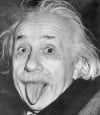

Albert Einstein was a German-born theoretical physicist who developed the theory of general relativity, effecting a revolution in physics. For this achievement, Einstein is often regarded as the father of modern physics and one of the most prolific intellects in human history. He received the 1921 Nobel Prize in Physics "for his services to theoretical physics, and especially for his discovery of the law of the photoelectric effect". The latter was pivotal in establishing quantum theory within physics.
Birthday: March 14, 1879
Nine of Diamonds Life Path: 42/6 Attitude: 17/8
 “Any man who reads too much and uses his own brain too little falls into lazy habits of thinking.” - Albert Einstein
“Any man who reads too much and uses his own brain too little falls into lazy habits of thinking.” - Albert Einstein